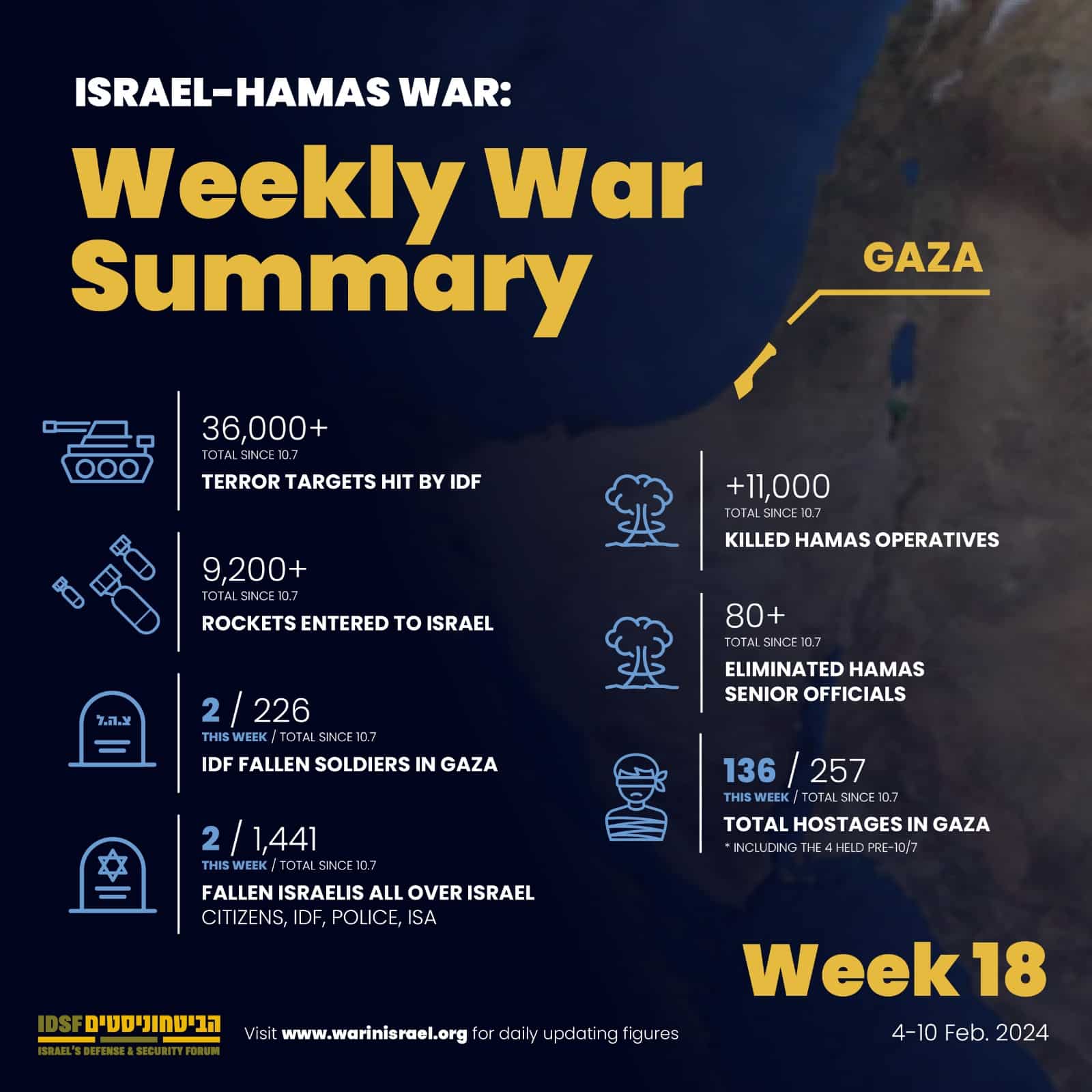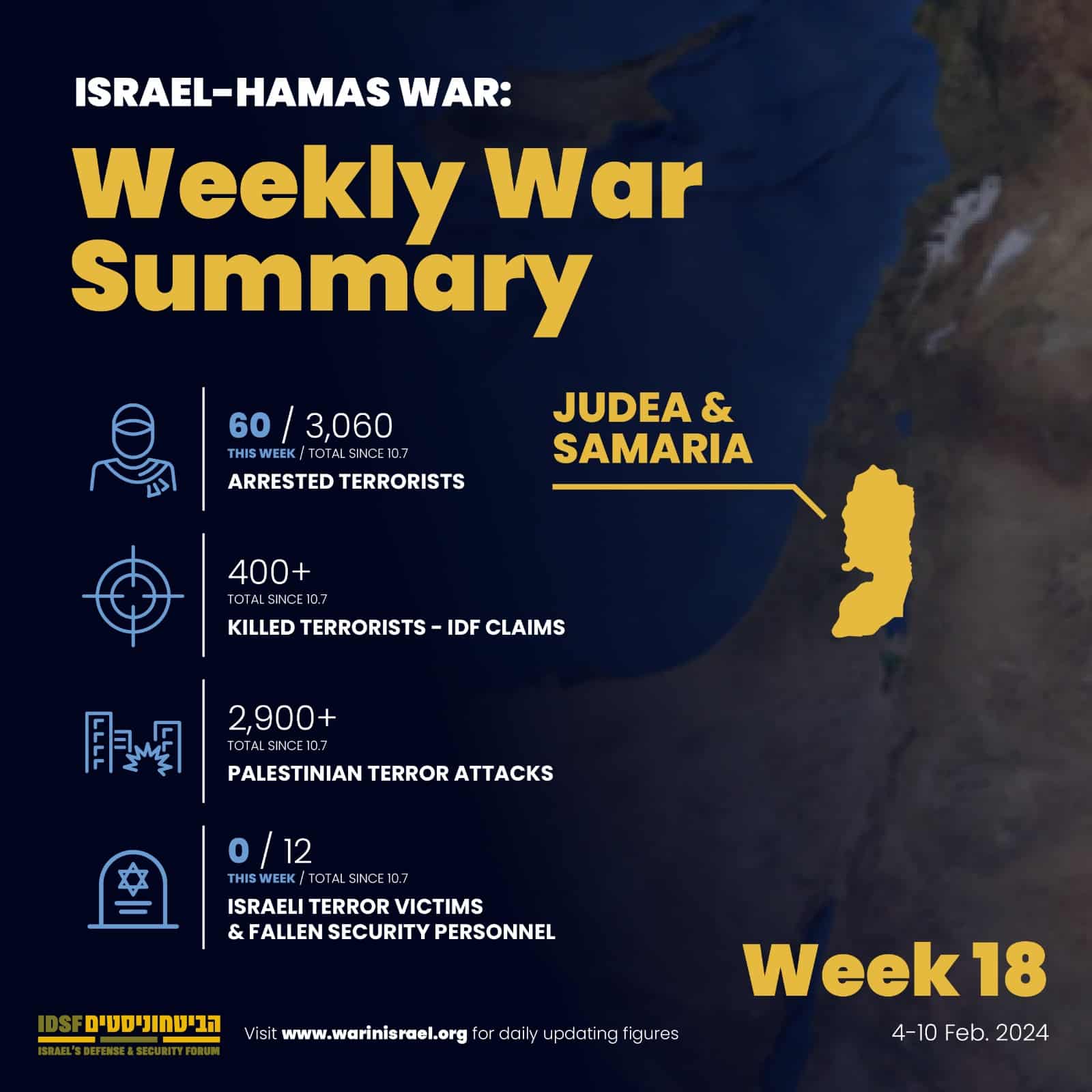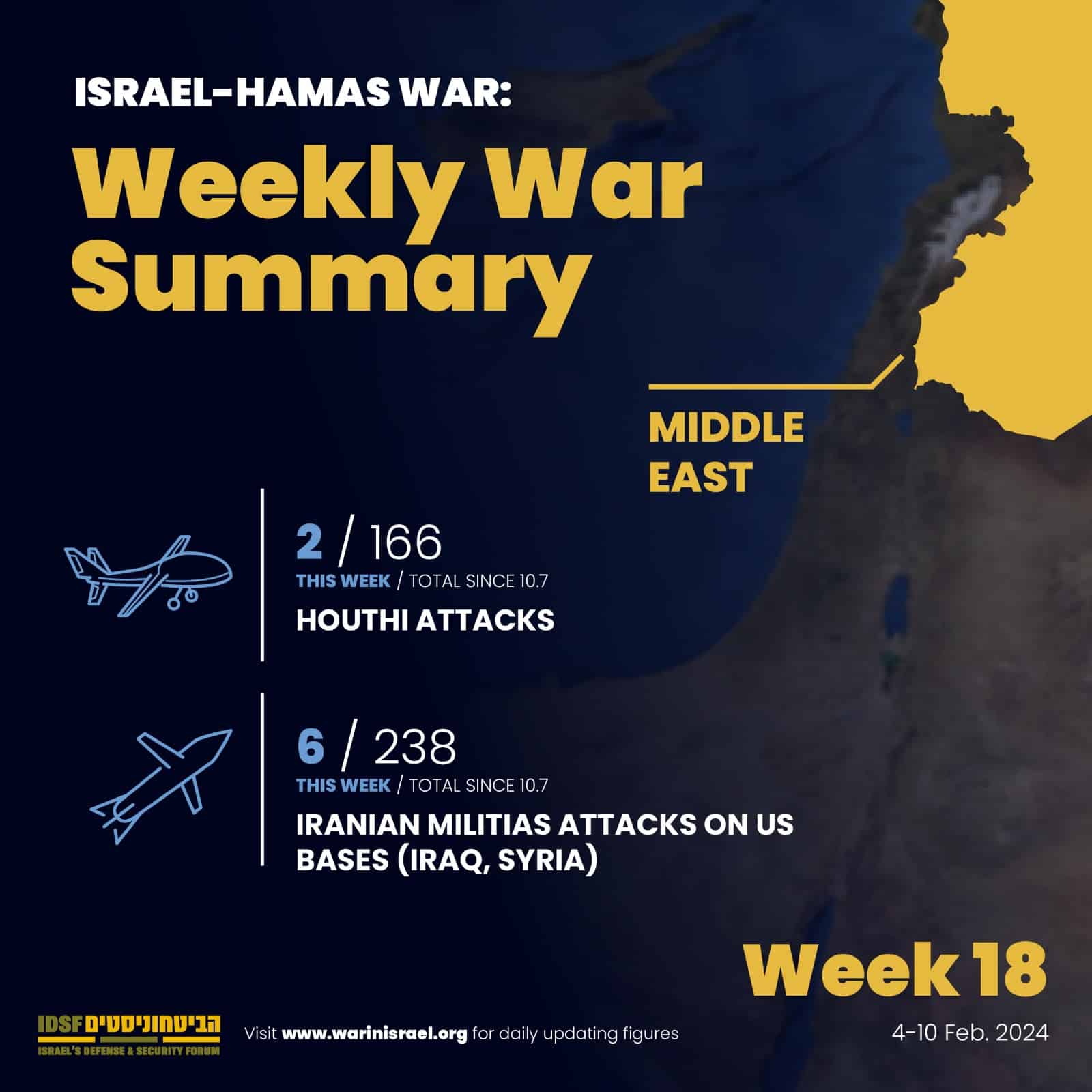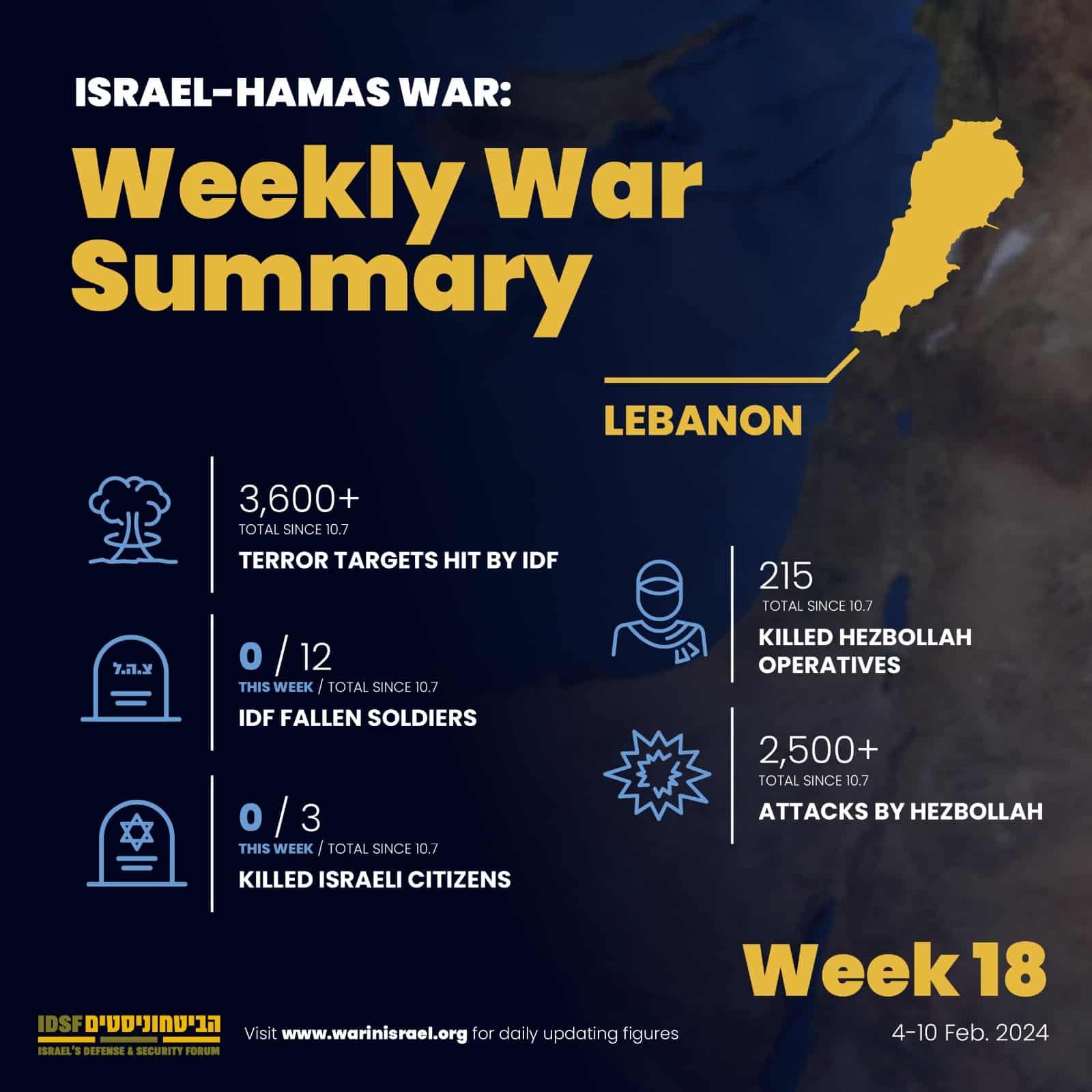Account of the main events in the Israel-Hamas war and hostilities by the Iranian Axis

Overview
- Argentina’s President, Javier Milei, made Israel the first state visit of his Presidency, where he promised to move the Argentine embassy to Jerusalem.
- After US President Joe Biden referred to Israeli military actions as “over the top”, White House press secretary Karine Jean-Pierre elaborated, saying “nothing has changed” in Biden’s and the administration’s messaging around the war. Biden’s “position hasn’t changed.”
- After Israel passed its new budget, Moody’s downgraded Israel’s credit rating from A1 to A2. It is the first time that Israel’s credit rating has been downgraded in its history and has drawn heavy criticism for wrongly depicting the steadfastness of Israeli economy in spite of the war.
- Egypt, Qatar and the US are pressuring Hamas to improve its hostage deal offer. They hope to restart negotiations in Cairo on Tuesday.
- According to Israeli officials, 18 of the 24 Hamas battalions have been destroyed. The next target for Israel’s operation will be Rafah, the southernmost city in the Gaza Strip.
- US Secretary of State Antony Blinken and National Security Spokesman John Kirby asked Israel to avoid military operations in Rafah, explaining that those actions would lead to a severe humanitarian disaster.
- To prevent a wave of Palestinian refugees, Egypt ramped up its security adjacent to its border with Gaza installing a concrete wall with barbed wire.
- Israel exposed a vast tunnel network under UNRWA’s central Headquarters in Gaza City. It was discovered in the affluent Rimal neighborhood, home to Hamas’ top officials before the war. These tunnels included a sophisticated technological infrastructure including servers that contained Hamas’ intelligence collections on it. An IDF commander said that they found some of the servers used by Hamas in the tunnel under UNRWA were connected to UNRWA’s servers.
- Uri Gordin, commander of the Northern Command, met with the municipal leaders in northern Israel and advised them to prepare for a wider war.
- The CEO of the MAERSK shipping company said that the US navy admitted to them that they do not have the capability to secure free passage in the Red Sea.
- Iran announced joint naval exercises with Russia and China in the upcoming weeks.
- The IDF unveiled new information it found in the Gaza Strip showing the money transfers Hamas received from Iran- $150 Million over 6 years between 2014 and 2020.
International
- Argentina’s President, Javier Milei, made Israel the first State visit of his Presidency and promised to move the Argentine embassy to Jerusalem. He met with Prime Minister Benjamin Netanyahu and toured a kibbutz that was decimated on October 7th with Israeli President Isaac Herzog. Milei also visited Yad Vashem and reaffirmed his commitment to Israel. Milei appears to establishing an unprecedented reversal of a decades long hostile attitude towards Israel that has been prevalent in South America.
- It was published that Riyadh and Washington continued their talks about a possible normalization with Israel, in exchange for future American security guarantees. This was publicized after Riyadh announced on January 30th that it reached 90% of a trade agreement with Beijing.
- After Biden referred to Israeli military actions in Gaza as “over the top”, White House press secretary Karine Jean-Pierre elaborated, saying “nothing has changed” in Biden’s and the administration’s messaging around the war. Biden’s “position hasn’t changed.” “I don’t think his messaging has changed,” she told reporters at a White House briefing.
- King Abdullah of Jordan is expected to meet with President Biden next week in Washington, marking the first visit by an Arab head of state to the US since the beginning of the war. Abdullah is on a global diplomatic mission to garner international support for a ceasefire in Gaza which will include stops in Canada, France and Germany.
- Canada’s Foreign Minister, Mélanie Joly, announced that Canada would sanction “radical settlers” who were involved in violent incidents against Palestinians, and it would also sanction the leaders of Hamas.
- US National Security Advisor, Jake Sullivan, said the President is determined to respond to attacks against the US but he does not seek to widen the conflict in the Middle East. He said there will be additional stages to the US response to 3 American soldiers who were killed in Jordan.
- The UN Security Council conducted a discussion initiated by Russia regarding US and UK attacks against Iranian proxies in the Middle East. The Iranian ambassador condemned the US attacks calling them illegal and that the resistance groups are independent, and their actions are a response to the US illegal presence in their countries and the “genocide” in Gaza.
- UN Secretary General, Antonio Guterres said that after the allegations that UNRWA employees participated in the October 7th massacre, he plans to set up a Commission of Inquiry headed by France’s former foreign minister that would investigate all claims against the agency in order to assess whether UNRWA did all it could to stay neutral and respond to any allegations of violations to its neutrality.
- UN Secretary General, Antonio Guterres gave a speech at the General Assembly where he expressed concern about reports of expanding the military offensive to Rafah. This measure would exacerbate what he called a “humanitarian nightmare”. He called for an immediate ceasefire and a release of all hostages.
- Nicaragua asked the International Court of Justice to join South Africa in its case accusing Israel of genocide. Nicaragua said that it believes Israel violated its commitments to the Genocide Prevention Convention.
- There is an EU effort to sanction Israeli settlers. This move was blocked by Hungary and the Czech Republic. Budapest said that it is not a time to sanction settlers and that the EU should focus on helping Israel defeat Hamas and release the hostages.
- The Saudi Arabia Foreign Ministry released a statement laying out preconditions to establishing normalized relations with Israel:
- Israeli recognition of a Palestinian State along the 1967 ‘cease-fire lines’ with a capital in East Jerusalem
- Stopping the war in Gaza
- A withdrawal of “Israeli occupation forces”
Analysis: This would necessitate the removal and evacuation of the half a million Israeli’s living in Judea & Samaria, which makes the proposal obsolete. The Palestinian Authority has made it clear that Israelis would not be tolerated in their envisioned Palestinian State. It would also threaten Israeli security as it would allow for the mountains of Judea and Samaria to be launching sites for missiles targeting Israel’s main international airport, the Tel Aviv metropolitan area, Israel’s central economic residential hub. This would also exacerbate the weapons smuggling that crosses into Israel from Jordan through the Jordan Valley leading to a proliferation of arms in Judea in Samaria in preparation for the next war against Israel similar to how Israel cannot leave Gaza without taking control of the Philadelphi Corridor – the primary smuggling route along the Egyptian border.
The Saudi preconditions do not necessarily mean that these are the actual Saudi demands, as it could be what they need to say to avoid being accused of abandoning the Palestinian cause ahead of a possible normalization deal. This could also be a negotiating tactic in order to get a better deal for normalizing ties with Israel from the US.
Domestic Arena
- Ahead of a new military draft bill which plans to lengthen the mandatory service from 32 months back to 36 months, increasing the reserve units by 4, and boosting significant reserve time annually, the Israeli government is facing scrutiny over its refusal to create a path for Ultra-Orthodox men to draft. The plan also increases the reserve duty requirements from 42 days a year to 54 days and increases the retirement age for officers.
- After Israel passed its new budget, Moody’s downgraded Israel’s credit rating from A1 to A2. It is the first time that Israel’s credit rating has been downgraded in its history. In the report announcing the negative change, Moody’s warned that another downgrade is very likely due to the war and the ongoing social tensions in Israel. Israeli Minister of Treasury and other senior officials in the financial sector rejected the findings as political, saying the Israeli economy showed significant resilience even at time of war.
Gaza Strip

Diplomatic
Hamas presented their list of demands to Israel in their hostage negotiations which included the release of thousands of Palestinian terrorists, IDF withdrawal from the Gaza Strip and assurances Hamas would stay in power and the halting of the war indefinitely for four months. These maximalist demands are so all-encompassing that no Israeli government could accept them, and were rejected by Netanyahu as it would essentially mean capitulation to Hamas.
The US is becoming less patient with the conflict and seeks to end it as soon as the US Presidential election season heats up and the continued war in Gaza continues to hemorrhage support from key Democratic constituencies. Secretary of State Antony Blinken visited the region for the fifth time since October 7th for the stated goal of ending the war and not just temporarily halting it. It was the first time that the US was been outspoken in that way. The Biden administration started releasing more and more critical comments on how Israel has conducted the war including Biden’s comment in a press conference that Israel’s actions were “over the top”.
Deputy National Security Advisor, Jon Finer, met with Muslim leaders in Michigan, a swing state with a large Muslim community, reportedly expressing regret at the “missteps” the Biden administration has made in handling the war and affirming and “have left a very damaging impression… of how much the President, Administration and the country value the lives of Palestinians,” will pledging to be more receptive to the plight of the Palestinians. He added that he had no trust in the Israeli government referring to some Israeli leaders as ‘somewhat abhorrent.’


Pamphlets dropped by the IDF in the Nusseirat Camp in Gaza calling Gazans to reject Hamas, saying that Hamas distanced the Palestinians from Al Aqsa by launching the “Al Aqsa Storm” attack and brought nothing but poverty and humiliation to them | Credit: Jihad Land on Telegram, https://t.me/eretzh
- Egypt, Qatar and the US are pressuring Hamas to strengthen its hostage deal. They hope to restart negotiations in Cairo on Tuesday. CIA director Bill Burns is expected to participate along with Head of the Mossad David Barnea, Shin Bet Director Ronen Bar and Major General Nitzan Alon, the IDF point person for the hostage negotiations. Qatari Prime Minister Sheikh Mohammed bin Abdulrahman al-Thani and Egyptian Intelligence chief Abbas Kamel are also expected to participate.
- Israeli Prime Minister Benjamin Netanyahu is conducting a publicity campaign (in Hebrew and English) that he will only accept complete victory over Hamas, implying that as Israel approaches its final stages of the war, the negotiations with Hamas are unlikely to result in a deal.
- According to reports, Israel would be willing to maintain the 3:1 ratio of terrorists released for every hostage without releasing the “heavy” terrorists that were central to the first hostage release deal. Israel agreed to a release in 3 batches while Hamas is pressing for a longer release period and in 4 batches.
- An Israeli delegation of more than 100 representatives of families of the hostages will arrive next week in the Hague to file a formal complaint against the heads of Hamas at the ICJ.
Operational
According to Israeli military officials, 18 of the 24 Hamas battalions have been destroyed. The next target for Israel’s operation will be Rafah, the southernmost city in the Gaza Strip. Defense Minister Yoav Gallant announced that the next part of the war would focus on destroying the four Rafah battalions and the two battalions that remain in Khan Younis and Nuseirat.
Rafah remains a very delicate target as approximately 1.4 million Palestinians are crammed into the city that housed 270,000 people before the war. Most of these inhabitants left other parts of Gaza as instructed by the IDF, in order to avoid a heavier toll of civilian casualties. Conducting military operations there would likely lead to significant civilian casualties as well as significant friction with Egypt.
Egypt has remained adamant in its demands to restrict Israeli operations in the border city, as they fear a wave of refugees fleeing through its border with Gaza. Egypt views any actions that lead the Palestinian population into its territory as a violation of the 1979 peace treaty they signed with Israel. This warning was repeated to Secretary Blinken who visited Cairo on Wednesday. Egypt ramped up its security adjacent to the border installing a concrete wall with barbed wire and has also brought in 40 tanks and APCs, cameras, mines, built sniper outposts and deployed more Egyptian troops to the area. Any Israeli military action in the area would likely begin with “flattening” the area through airstrikes and other actions which could potentially create holes in the border fence with Egypt.
The IDF’s plans include advising Gaza civilians to move northward, just a few hundred meters, in order to create a clean corridor to operate from as was laid out in an IDF battle plan weeks ago.
Secretary Blinken NSA Spokesman John Kirby asked Israel to avoid the military operations in Rafah explaining that those actions would lead to a severe humanitarian disaster.
- Israel exposed a vast tunnel network under UNRWA’s Central Headquarters in Gaza City. It was discovered in the affluent Rimal neighborhood, home to Hamas’ top officials before the war. These tunnels included a sophisticated technological infrastructure including servers that contained Hamas’ intelligence collections on it. An IDF commander said that they found some of the servers used by Hamas in the tunnel under UNRWA were connected to UNRWA’s servers. They found that cables connected to UNRWA servers were severed in order to try to hide evidence of collaboration. Inside UNRWA’s headquarters, IDF troops also found weapons and IEDs and even rooms used by Hamas fighters themselves.
- A Hamas faction calling itself the Mujahadeen movement celebrated its anniversary since its establishment and to celebrate it shot rockets at 13 locations in the Gaza envelope from the north and central strip, areas that are largely under Israeli control, indicating that there is still more work needed by the IDF to clear the area of the enemy.
- PIJ and other factions including the Mujahadeen movement attacked IDF troops in a graveyard to the east of the Jabalia neighborhood in Northern Gaza.
- More and more terrorists are surrendering. A captured Hamas terrorist explained in a released video from his interrogation that many terrorists are preferring to surrender than keep fighting.
- In the beginning of the War, the IDF required three divisions to conquer northern Gaza. Now, however, it is being maintained by only a few battalions and a brigade demonstrating the damage done to Hamas’ infrastructure.
- IDF troops found and destroyed a kilometer long tunnel in Khan Younis which was used to hold the hostages.
- In the Al Amal neighborhood of western Khan Younis, the paratroopers brigade is deepening its offensive and the Givati have conquered a Hamas outpost and a training center, while taking control of official offices of Hamas leaders including Muhammad Sinwar, Yahya Sinwar’s brother.
- The IDF is operating effectively in Rafah and increasing its activity. It has eliminated two Hamas commanders in separate aerial strikes, a few hours apart.
- According to reports, only 105 out of the 136 hostages remain alive.
- The IDF spokesperson in Arabic published an image of Hamas leader Ismail Haniyeh’s son enjoying a soccer match in VIP seats in Doha, Qatar.
- IDF Chief of Staff Lieutenant General Herzi Halevi and Shin Bet Director Ronen Bar visited Khan Younis. Halevi declared that there is still more work to be done but that the Khan Younis brigade is almost completely destroyed. Bar said that the damage that the IDF caused to Hamas’ intelligence network is enjoying a not something it will be able to recover from.


Lebanon
Operational
The battle equation remains consistent; Hezbollah continues to choose the pace of attacks and Israel reacts. The recent escalation by Hezbollah included a more frequent use of Burkan rockets and Falaq-1 missiles with a heavier payload of 50 KG.
- According to the Israeli government, there have been 512 houses in northern Israel that have been damaged by Hezbollah since the start of the war. The damage ranges from minor to total destruction.
- The IDF attacked over 3,500 Hezbollah targets and have eliminate more than 250 terrorists since the beginning of the war.
- A total of 10 terrorists in Lebanon were eliminated this week.
- A Hezbollah regional commander, Abbas A-Dabbas, was eliminated in his car in a targeted strike in the southern Lebanese town of Nabatia. He was reportedly in charge of the Shi’ite organization’s ties to the IRGC’s Aerial Defense mechanism in Syria. No responsibility has been taken by Israel or any other entity.
- The IDF continues its training for a wider conflict with Hezbollah along the Lebanon border and is reportedly training for a preemptive strike. Dozens of battalions are reportedly participating in these exercises.
- Hezbollah attacked Israel nine separate times on Friday which led Israel to retaliate via airstrikes in southern Lebanon as well as an Iranian target in Damascus.
- Division 36 which participated in the war in Gaza is now training and practicing its military maneuvers in northern Israel ahead of a possible escalation with Hezbollah. Since the beginning of the war there were 50 battalion level drills and 120 company level drills.
- An antitank missile hit a house in the Israeli town of Kiryat Shmona. The IDF retaliated with artillery fire.
- Hamas commander, Basal Salah, was eliminated. He was responsible for recruiting Hamas operatives in Judea and Samaria.
- Hezbollah fired the largest rocket barrage since the beginning of the war, shooting over 30 rockets at one time.
Diplomatic
- Israel is waiting for progress from the American-led efforts at mediation with Hezbollah to achieve results but is becoming less optimistic. Major General Uri Gordin, commander of the Northern Command, met with the municipal leaders in northern Israel and advised them to prepare for a wider war.
- The U.S. and four of its European allies, the U.K., France, Germany and Italy, hope to announce in the next few weeks a series of commitments made by Israel and Hezbollah in order to resolve the tensions diplomatically. Sources revealed that the new understandings would not be officially signed by the parties but the U.S. and four European allies would issue a statement detailing the commitments each side has agreed to make. The proposal is based on the model of the 1996 “Grapes of Wrath” understandings between Israel and Hezbollah that were declared by the U.S. and other world powers to end the Israeli military operation in Lebanon at the time. The Lebanese army is expected to send 10,000 to 12,000 troops to the area along the border with Israel. Moreover, Lebanon would receive economic benefits to sweeten the deal for Hezbollah as they would be able to credit their military operations for the improvement in the Lebanese economy.
Judea and Samaria

- Tor Wennesland, the United Nations Special Coordinator for the Middle East Peace Process, met with PA President Abbas, who asked the UN to pressure Israel to end the war. He said that no part of the Strip could be annexed by Israel and more aid needs to enter Gaza. He repeated his request the UN should recognize the Palestinian Authority as a State and grant it full membership.
- Riyad al-Maliki, the PA Foreign Minister, met with the French Foreign Minister advocating for a ceasefire. He referred to the Israeli actions as “genocide”. PA officials along with Hamas and other organizations are conducting a campaign to label Israel as carrying out a genocide in order to isolate it diplomatically. They are trying to permeate Israel with the term “genocide” in order to permanently associate Israel with the term. PA’s anti-apartheid department conducted an orientation day in which it called on countries around the world to take diplomatic and economic steps against Israel.
- Hamas is mirroring Israel’s public diplomacy efforts in portraying Palestinian terrorists as hostages kept by Israel in dire conditions.
- PA Prime Minister, Mohammed Ashtiya, said in an interview that Hamas’s proposal was welcomed but he was not sure Israel would go on with it. He mentioned that the request to release terrorist Marwan Barghouti who is a national Palestinian symbol is something the PA wants before any discussions about the future. He said that any return of the PA to Gaza would have to be under a comprehensive national Palestinian agreement.


Israel News on Telegram, https://t.me/newsil_tme
Iraq and Syria

- The US conducted a drone strike which killed a leader from Kataib Hezbollah who was responsible for the attack that killed 3 American soldiers in Jordan.
- The Jordanian air force attacked in Southern Syria and killed 3 Hezbollah affiliated Captagon traffickers.

Yemen
The CEO of the MAERSK shipping company said the US navy admitted to them that they have no capability of securing safe passage in the Red Sea. If true, this is a global travesty. The Houthi threat which “only” started with a few attacks on Israel, now poses a clear threat to global trade routes and an effective blockade on the Bab el Mandeb Straits. The Americans are hesitant to escalate, as they do not seek further confrontation with Iran, but the Administration is facing criticism from Congress for its meek response. The US appears unyielding in efforts to recognize a Palestinian state via the Saudi-Israeli normalization track. Providing the Palestinians with a state after the October 7th massacre would make October 7th the Palestinian Independence Day and would forever forge this conflict in the Palestinian national consciousness. This would only bolster the Palestinian voices that believe in resistance as they would argue, it had brought them a state. It would also send the exact wrong message to Iran and any other international bad actor, that horrific attacks on the scale of October 7th will eventually lead to the achievement of elusive political goals.
- On Thursday, the US conducted attacks on 7 northern locations in what it called as preemptive attacks.
- 40 Houthi operatives were killed in the joint British and American airstrikes earlier this week.
- The American response to the 3 American soldiers who were killed in a UAV attack was considered mild as the US did not hit any “high value” targets from the IRGC, and IRGC senior commanders were given enough time to evacuate. In Yemen the US is having a difficult time collecting intelligence as they do not have operatives on the ground. The attacks on Yemen are based only on aerial intelligence which is not enough to inflict serious damage. The Houthis use this fact and install fake missiles to misguide the US to attack these targets. This undermines the US reputation as a superpower as they are being toyed with a comparatively weak enemy who the US has not been capable of preventing from wreaking havoc on the global economy.
Iran
- Iran is continuing to threaten the US saying it is not afraid of a conflict and remarked that Iran’s enemies have not shot even a single round at Iran itself despite their hostility demonstrating that Iran views the US as weak.
- Iran announced joint naval drills with Russia and China in the upcoming weeks.
- Iranian President Raisi met with Ali Al-Sadiq Ali, Sudan’s Foreign Minister, and said that the rapprochement between Israel and several middle eastern countries (including Sudan) has caused grave damages to the Islamic Republic.
- The IDF unveiled new information it found in the Gaza Strip showing the money transfers Hamas received from Iran- $150 Million over 6 years between 2014 and 2020. This also includes money that Hamas officials took for themselves including Hamas’ Leader in Gaza Yahya Sinwar totaling millions of dollars. Ghazi Hamad, a member of Hamas’ political bureau said in an interview to Aljazeera that “they said a million times that Iran provides Hamas with money, weapons and political support and it is no secret”.


